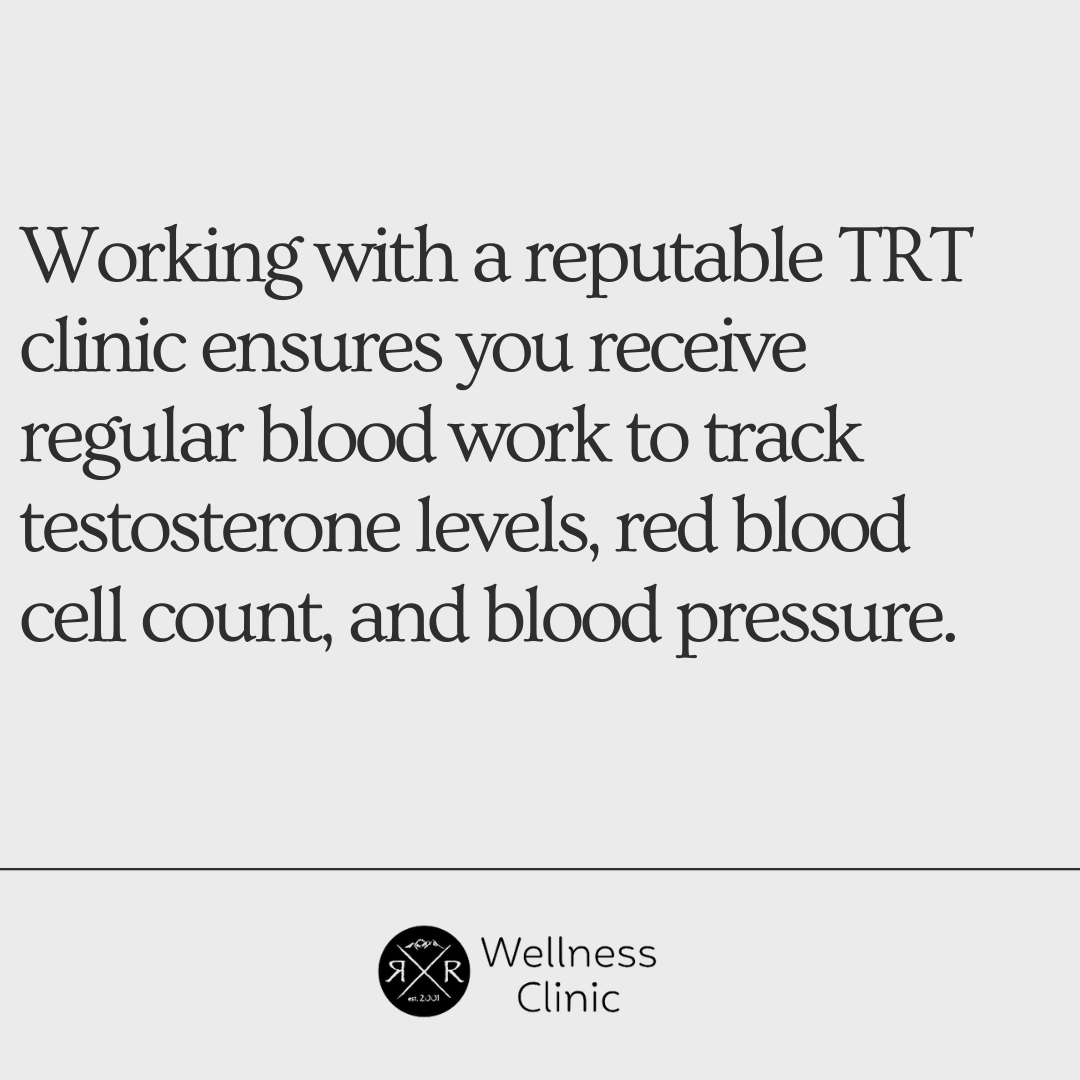Testosterone Replacement Therapy (TRT) is increasingly common, and it’s used by men dealing with fatigue, brain fog, low libido, and more. But as TRT use grows, so do questions about its side effects. One of the most frequently raised concerns? High blood pressure.
This isn’t just speculation, because testosterone plays a role in how your cardiovascular system functions. So if you're considering therapy, it’s worth understanding how TRT might affect your blood pressure and why ongoing medical supervision — through a trusted testosterone clinic near you or a licensed Utah wellness clinic — is essential.

What Is Testosterone Replacement Therapy?
Testosterone replacement therapy (TRT) is a medical approach used to raise testosterone levels when your body isn't producing enough on its own. It's typically prescribed after bloodwork confirms low levels, especially if you're experiencing symptoms like chronic fatigue, low libido, mood changes, or noticeable muscle decline.
If you're exploring this option, it's important to connect with experienced providers. Searching for testosterone clinics can help you find professionals who offer proper testing, clear treatment plans, and regular follow-ups to keep your health on track.
The Link Between Testosterone Replacement Therapy and Blood Pressure
Testosterone replacement therapy has shown both potential benefits and risks. One of the biggest concerns is its possible impact on blood pressure.
Can TRT Affect Blood Pressure?
Some research suggests TRT can cause a rise in systolic blood pressure, especially in men who already have certain risk factors.
In one clinical study involving opioid-treated men with low testosterone, those receiving TRT saw an average increase of 6.2 mmHg in systolic pressure compared to those on placebo, who saw a decrease. This rise was linked to increased hematocrit levels, meaning a higher concentration of red blood cells, which thickens the blood and can strain the cardiovascular system.
Potential Risks
Note that, ultimately, TRT will have different effects depending on your weight, baseline blood pressure, or whether you have underlying conditions like sleep apnea or heart disease. Individuals with higher body mass index (BMI) or elevated red blood cell counts may be more likely to see a spike in blood pressure during treatment.
A key concern is that TRT can stimulate red blood cell production, which, as stated, thickens the blood. This can raise vascular resistance and potentially elevate blood pressure, especially in those already predisposed.
When combined with other conditions — like obesity, cardiovascular disease, or untreated sleep apnea — the cumulative strain on the heart and blood vessels may significantly increase the risk of complications.
When It’s Not a Concern
When done through reputable testosterone clinics near you, TRT typically involves regular blood pressure checks, lab work, and dose monitoring, which can reduce risks significantly. Many clinics also tailor treatment plans based on your baseline health markers to avoid avoidable complications.

Benefits of Testosterone Replacement Therapy (When Managed Safely)
When monitored by professionals, testosterone replacement therapy can offer meaningful improvements in health and quality of life.
- Improved energy and mood. Many men report feeling more alert, motivated, and emotionally balanced.
- Better muscle mass and bone density. TRT can support lean muscle growth and reduce the risk of osteoporosis.
- Enhanced sexual health and overall well-being. It may boost libido, improve erectile function, and support confidence and vitality.
- Lower health risks when done through trusted testosterone clinics. Regular monitoring helps reduce side effects and keeps treatment safe and effective.
Who Is at Higher Risk for High Blood Pressure on TRT?
Some individuals may be more vulnerable to side effects from testosterone replacement therapy, especially when treatment isn’t closely managed. If you’re one of these, you’re at a higher risk:
- Men with pre-existing hypertension
- Individuals with lifestyle risk factors (poor diet, smoking, lack of exercise)
- Those not monitored by a proper Utah wellness clinic or medical provider
How to Manage Risks with TRT
Managing the potential risks of testosterone replacement therapy requires a combination of medical oversight, lifestyle changes, and choosing the right provider for ongoing care.
Clinical Monitoring
Consistent monitoring is essential when undergoing testosterone replacement therapy. Working with a reputable TRT clinic near me ensures you receive regular blood work to track testosterone levels, red blood cell count, and blood pressure.
This oversight helps detect early signs of adverse effects, such as elevated hematocrit or hypertension, and allows providers to adjust dosages or pause treatment when necessary.
Lifestyle Adjustments
Your lifestyle plays a major role in how your body responds to TRT.
A diet low in sodium and rich in fruits, vegetables, and whole grains supports healthy blood pressure. Cutting back on alcohol and avoiding tobacco products also lowers cardiovascular risk.
Regular physical activity (especially aerobic and strength training) can help improve blood vessel elasticity, manage weight, and enhance overall heart health.
Choosing the Right Clinic
Not all hormone therapy clinics offer the same standard of care. When searching for testosterone therapy near me, prioritize licensed providers with a track record in hormone optimization and cardiovascular screening.
A reputable Utah wellness clinic often provides a more comprehensive approach, combining TRT with services like nutrition counseling, cardiovascular risk assessments, and holistic wellness strategies to support long-term safety and well-being.

Alternatives and Complementary Treatments
Before beginning testosterone replacement therapy, many providers recommend starting with foundational lifestyle changes.
Improving sleep quality, reducing stress, maintaining a healthy weight, and engaging in regular exercise can naturally support testosterone production. In some cases, these changes alone may help ease symptoms of low testosterone without the need for medical intervention.
Supplements like vitamin D, zinc, and ashwagandha are also commonly explored to support hormone balance, although their effectiveness can vary from person to person. Some individuals also consider therapies such as acupuncture or herbal medicine under the guidance of a licensed practitioner.
These complementary approaches may be suitable for men with mild symptoms or borderline hormone levels.
However, testosterone replacement therapy may still be the right option for those with clinically low testosterone and persistent symptoms that don’t respond to lifestyle or supplemental efforts. A qualified healthcare provider can help determine when TRT is appropriate and when alternative options might be enough.
FAQs About TRT and Blood Pressure
Does testosterone replacement therapy always cause high blood pressure?
No, TRT doesn't always raise blood pressure. It varies based on individual health factors and monitoring.
How often should blood pressure be monitored while on TRT?
Blood pressure should typically be checked every few months or as advised by your provider.
Can I still start TRT if I already have hypertension?
Yes, but only after careful consideration and under close supervision from a healthcare provider who can manage both conditions.
Are TRT clinic near me options safe compared to national programs?
Local TRT clinics can be just as safe if they offer licensed care and regular monitoring. These clinics also offer convenience and help reduce overall costs due to their proximity.
What makes a Utah wellness clinic a good choice for TRT?
A quality Utah wellness clinic provides personalized, full-spectrum care with an emphasis on safety and long-term health.

Conclusion
Testosterone replacement therapy can offer significant benefits for men with low testosterone, but it’s important to understand the potential impact on blood pressure and overall cardiovascular health. With proper clinical monitoring, lifestyle support, and personalized care, many men safely manage TRT without complications.
If you're considering testosterone replacement therapy, reach out to RR Wellness Clinic to explore your options with expert guidance and ongoing support tailored to your needs.
Reviewed by:


